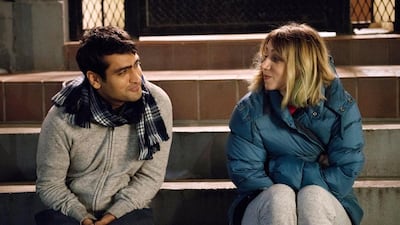Growing up in Pakistan’s chaotic megacity of Karachi, Kumail Nanjiani never imagined he would one day star in a Hollywood romcom, let alone emerge as a leading man in Donald Trump’s America.
The Big Sick, which opened in selected American cinemas on Friday – there is no word yet of a UAE release – brings to the big screen the real-life story of how the 39-year-old comedian met and fell in love with his American wife, Emily Gordon.
It tells of their courtship, how Nanjiani’s strict Muslim parents tried to set him up with an arranged marriage, and how Gordon fell gravely ill, forcing him to take charge and build a relationship with her parents.
Nanjiani and Gordon co-wrote the script and shot the movie long before Trump’s election, but attempts by the new president to ban visa-holders from certain Muslim countries has given the film topicality and a heightened potency. The way it challenges stereotypes in American popular culture, by portraying Muslims as regular people rather than the more common depiction as terror suspects or fighters, has taken on much greater political significance than the filmmakers intended.
“Obviously, it would be great if our movie came out, and people didn’t see it as a political statement, because it really isn’t,” Nanjiani reportedly said at the Los Angeles premiere. “It is just a love story and a comedy.”
The movie had its world premiere in January at the Sundance Film Festival – on the day of Trump’s inauguration, ironically – and Amazon acquired the distribution rights for a reported US$12million (Dh44.08m), which is said to be one of the biggest deals in Sundance history.
Nanjiani, who plays a tweaked version of himself, stars opposite Zoe Kazan as Gordon, and Ray Romano and Holly Hunter as her parents. The son of parents from Pakistan’s teeming business capital on the Arabian Sea, Nanjiani moved to the United States to study at Grinnell, a liberal arts college in Iowa, in 1997.
He got into comedy at university. After graduation he moved to Chicago where he worked in computer science by day and performed stand-up at night. He likes to say he was inspired to get into comedy by British actor Hugh Grant's best-man's speech in the 1994 film Four Weddings and a Funeral.
But if Grant personifies a certain type of stuttering Englishman, Nanjiani has joined a stable of US comedians treading ground more commonly associated with intellectuals than gags for laughs.
At a stand-up performance in New York to promote the movie, he joked about the difficulty of obtaining US citizenship, getting racist abuse on Twitter and being able to vote in last year’s election. “It really made a huge difference,” he said, with irony.
“People are like, ‘Go back to India’. I’ve never been to India,” he deadpanned, claiming he fantasised about being able to save a racist’s life, just to “see the awkward look on their face”.
When he returned to Grinnell to deliver the commencement address last month, he spoke of being heckled with racist abuse at gigs and rejected at auditions for not being “American” or “good-looking” enough.
Nanjiani is not the only US comedian from a Muslim South Asian background with a soaring profile. Hasan Minhaj, a first-generation Indian-American starred in a Netflix stand-up special tackling immigration and hosted the 2017 White House Correspondents’ Dinner.
Aziz Ansari, the best known of the three, similarly tackles casual racism, immigration and cross-cultural relationships in his own Netflix project, Master of None, a series about a 30-something actor in New York.
Yet however polarised the US might feel, America is possibly the only place where Nanjiani could have achieved such success.
Husain Haqqani, a former Pakistani ambassador to Washington and now fellow at the Hudson Institute think tank, views Nanjiani’s success as “proof that individuals of all communities and countries can do well when they have the opportunity”.
* Agence France-Presse

